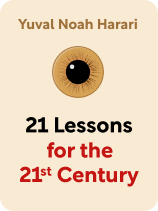

This article is an excerpt from the Shortform book guide to "21 Lessons for the 21st Century" by Yuval Noah Harari. Shortform has the world's best summaries and analyses of books you should be reading.
Like this article? Sign up for a free trial here .
What is the difference between the mind vs the brain? How do we know that the contents of the mind are generated by the brain?
There is a fine line between the mind vs the brain. The brain is a physical organ, and therefore it can be studied externally, while the mind is the source of subjective experiences, and therefore it can only be observed internally. Experts assume that the mind is a product of the brain, but there’s no proof since you can’t peer into the mind using a brain scanner.
Keep reading to learn about the mind vs the brain.
The Mind vs the Brain: What Do We Know?
What do we know about the mind vs the brain? While scientists know much about the brain—and ongoing research with new technologies are constantly adding to that database—they know little about the mind. Whereas the brain is a physical organ with a network of neurons, biochemicals, and synapses, the mind is the source of subjective experiences, including love, pleasure, pain, and anger.
Currently, there are only two ways to study the mind:
- Ask people to report on their subjective experiences, though second-hand accounts are always subject to distortions.
- Have researchers observe their own minds, which is difficult to do objectively.
In order to take useful notes of the workings of their own minds, scientists need methodical strategies. There are few modern methods for self-observation of the mind, so researchers could turn to meditation techniques, which were developed to help people observe their minds and bodies methodically and objectively.
Increasingly, scientists are studying the brains of experienced meditators—but this approach only goes so far. When researchers scan a meditator’s brain, they gain information about how meditation affects the brain, which is valuable, but they don’t gain any insight into the mind. In order to truly observe the mind, scientists would need to practice meditation themselves. This approach requires time and dedication because when most people begin meditating, they struggle to concentrate for more than a few seconds at a time. Scientists would have to train for months or years to be able to collect the data they need.
Meditation and the Mind
You must understand your mind to make sense of the world, and meditation is one of the best ways to do that. In order to understand life, you must understand your own mind, because your mind determines how you experience, interpret and react to the world around you.
The better you know your mind, the more you’ll realize that your thoughts and emotions are not as straightforward as you think. Your thoughts are a reflection of your brain wiring and your external influences. Furthermore, your emotions are a reflection of your physical sensations: External events trigger a physical reaction, and your emotions reflect that physical sensation. For example, if you read a politician’s offensive tweet, the hot feeling in your stomach is your first reaction, and the anger you feel is a reaction to that sensation.

———End of Preview———
Like what you just read? Read the rest of the world's best book summary and analysis of Yuval Noah Harari's "21 Lessons for the 21st Century" at Shortform .
Here's what you'll find in our full 21 Lessons for the 21st Century summary :
- What the unique challenges of the 21st century are and will be
- Why religion can't solve these 21st-century challenges
- How algorithms like Netflix recommendations are teaching you not to trust yourself






